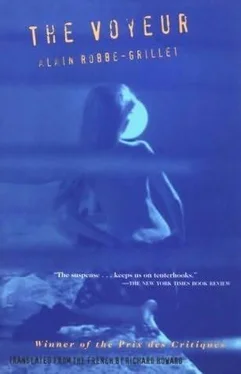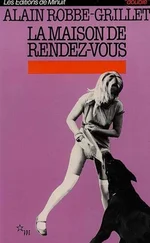The surrounding patch of road changed color. Mathias raised his eyes toward the sky. Moving rapidly, a cloud half-torn apart by the wind covered the sun again. The day was gradually becoming overcast.
The salesman mounted his bicycle and continued on his way. The air was growing cooler, the duffle coat more bearable. The ground neither rose nor fell; the good condition of the road made riding easy. The wind blew from the left, not impeding the bicyclist, who was pedaling rapidly, almost effortlessly, his little suitcase in one hand.
He made a stop at an isolated cottage at the edge of the road—a simple one-story dwelling of the most ordinary kind. Two clumps of mahonia framed the doorway, as in front of most of the island’s houses, and at the rear too. He leaned his bicycle against the wall under the window and knocked at the door panel.
The person answering the door appeared in its opening at a much lower level than he had expected. It was doubtless a child—height and size considered—even a rather young child—but Mathias could not decide whether it was a boy or a girl, for the silhouette quickly retreated into the shadow of the hallway. He stepped in and closed the door behind him. Because of the half-darkness to which his eyes had not yet had time to grow accustomed, he did not know by what means the next door he passed through was opened.
A man and a woman were seated facing each other across a table. They were not eating; perhaps they had already finished. It looked as though they were expecting the salesman.
Mathias set down his suitcase on the unpatterned oilcloth. Taking advantage of their tacit consent, he unpacked his merchandise while delivering his sales-talk with some assurance. The two people sitting in their chairs listened politely; they even examined the strips of cardboard with a certain interest, passing them back and forth to each other and attempting one or two comments: “This is a practical shape,” “This is a more elegant case,” etc…. But they seemed to be thinking of something else—or of nothing at all—to be weary, distressed, chronically ill, or perhaps suffering from some tremendous disappointment; their comments were confined to scrupulously objective remarks: “This one is thinner,” “The other has a convex glass,” “Here’s a rectangular face,” …of which the obvious futility did not seem to disturb them.
Finally they decided on one of the cheapest models—one just like the one the old country woman had bought. They indicated their choice without enthusiasm, and as if without reason. (“Why wouldn’t this one do just as well?”) They exchanged no words with the salesman himself. It was as if they scarcely saw him. When the man had taken out his wallet and paid for the watch, Mathias regretted not having insisted on an item two or three times as expensive, thinking that they would have paid for it with no more hesitation, with the same indifference.
No one came to show him out. The new watch (with the metal strap) was still lying on the oilcloth between the woman and her ahead)’ distracted companion: shiny, lost, unjustified.
There was not another house until the village at Black Rocks. Mathias pedaled steadily for about two-thirds of a mile. The bicycle cast only a pale—and intermittent—shadow which soon disappeared altogether. Against the gray background of the sky, in which only a few vague blue spots remained, rose the lighthouse, now quite near.
The structure was one of the highest of the countryside, as well as one of the most massive. Besides the white-painted, slightly conical tower itself, it included a semaphore, a radio station, a small power-house, four enormous foghorns for bad weather, and several accessory structures sheltering machines and equipment, as well as lodgings for the workmen and their families. Had these employees been engineers or even mechanics, they would have constituted a wealthy enough clientele for Mathias, but unfortunately the lighthouse workers were not the sort who bought their watches from traveling salesmen.
There remained the village proper. Originally merely a cluster of three or four farmhouses, it had grown with the neighboring installations, although more modestly Even had Mathias’ memory been better, he would scarcely have recognized it, so much had it developed since his childhood: perhaps ten cottages, jerry-built but of neat appearance, now surrounded and concealed the original group, whose thicker walls, lower roofs, and smaller windows were evidence of their earlier date. The new constructions were not a part of the world of wind and rain: although actually quite similar to their predecessors—granted certain minor differences—they seemed without climate, and at the same time without history and geographical location. It was remarkable that they managed to withstand, with apparently equal success, the same raw weather as the others; unless atmospheric conditions had grown somewhat gentler…
It was no different now from anywhere else. There was a grocery and a café, of course, almost at the beginning of the village. Leaving his bicycle near the door, Mathias went in.
The arrangement inside was like that of all such establishments in the country or even in the suburbs of big cities—or on the quays of little fishing ports. The girl behind the bar had a timorous face and the ill-assured manners of a dog that had been ill-assured manners of a dog that had been ill-assured manners of a girl who served behind the…. Behind the bar, a fat woman with a satisfied, jovial face beneath her abundant gray hair was pouring drinks for two workmen in blue overalls. She handled the bottle with the sure gestures of a professional, raising the neck with a slight rotation of her wrist at the precise moment the liquid reached the edge of the glass. The salesman went to the bar, set his suitcase on the floor between his feet, and ordered an absinthe.
Without thinking, the salesman was about to order an absinthe when he changed his mind—just before having spoken the word. He cast about for the name of some other kind of drink, and, unable to think of any, pointed to the bottle the proprietress was still holding after having served the two lighthouse workers.
“I’ll have the same,” he said, and set the suitcase on the floor between his feet.
The woman put in front of him a glass like the first two; she filled it with her other hand, which had not yet released the bottle—making the same rapid movement, so that a large quantity of liquid was still in the air, between the bottom of the glass and the neck of the bottle, as she was already lifting the latter away. At the very second she had finished twisting her wrist, the surface of the poured liquid immobilized on a level with the edge of the glass—without the slightest miniscus—like a diagram representing the theoretical capacity of the glass.
Its color—rather dark reddish-brown—was that of the majority of wine-base aperitifs. Promptly returned to its place on the shelf, the bottle could not be distinguished from its neighbors in the row of different brands. Previously, when the woman had been holding it in her huge hand, the spread of the fingers—or else the position of the label in relation to the observer—had prevented him from determining its brand. Mathias wanted to reconstruct the scene in order to try to fasten on some fragment of bright-colored paper to compare with the labels lined up on the shelf. He succeeded only in discovering an anomaly which had not struck him at the time: the proprietress used her left hand to serve drinks.
He studied her more attentively as she rinsed and dried the glasses—with the same dexterity—but he could not establish a preliminary standard as to the respective functions of each hand in these complex operations; so that it was impossible for him to determine whether or not she was right- or left-handed. His mind grew so confused between what he saw with his own eyes and his recollection of the previous scene that he began to muddle right and left himself.
Читать дальше












